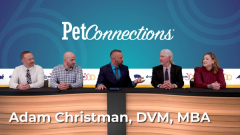
Parvo and hospital morale
Panelists discuss how to boost hospital morale while managing Parvo cases
Episodes in this series

Sponsored by Elanco Animal Health
Adam Christman, DVM, MBA
Talk to me a little bit about the impact Parvo can leave on the culture of the hospital, because let's face it, not all of them are going to live. And so this has got to be traumatizing. And sometimes there's instances where puppies are given up to the hospital to you, and like here, go forth and find a puppy home. So what does that like for your hospital?
Erik Zager, DVM, DACVECC
Yeah, so it can definitely be really difficult. I think that it is it is also important to kind of try to, as you said earlier, to look at the silver linings of things, and even that kind of experience of the Parvo puppy. I, myself, when I was a kid, my family dog had Parvo and was treated. Snd that treatment actually became a positive experience for my family and endearing them so much into that veterinary hospital veterinary care. That is probably one of the triggers of why I got into veterinary medicine, because it made such an impact on my family, that we were able to have a dog get through that horrible disease. And as a team, when you get those photos a month, a year later of that Parvo dog that you got out of the hospital outside playing, being a dog with their family...I mean, that is huge. And so, trying to look at those things, trying to build those veterinary client bonds over those kind of shared traumatic experiences, can turn that negative into a really big positive down the road.
Adam Christman, DVM, MBA
Sure. Well, I'm curious to get your thoughts on that, too.
Fathom Woods
It definitely is crushing. We tend to get really down if we have like a litter, for example, that it just wipes out the whole litter. Or the those little puppies under 5 pounds. They have like a less than 10% chance of survival. Typically, it's their little bodies, just get, you know, take the virus. We get invested in these dogs; we try not to get attached, but we do. And that can be really hard. My staff will just say I'm struggling really bad. Is it okay, if I leave a little bit early or go take a walk? You know, anything you can do to kind of clear your head because when you're surrounded by the virus all day long, and you see puppies suffering all day long, it can take a toll on you.
Erik Zager, DVM, DACVECC
One thing that I would recommend for hospitals that deal with this a lot is when you get those patients home, have somebody as your point person to reach out to those people a week, a month later. Get photos, get videos, get that feedback and share it with your whole hospital. It's very easy for owners. They'll email the vet and be like, thank you so much. Send that out to your whole hospital because it was the whole hospital team that has really been involved in that care. And it can be such a morale booster, to get those photos get those that those feedbacks of "Thank you, you've saved our puppy's life; you've saved our family. Thank you." And so really just making sure that you remember your whole team every step of that way and share all those positive success stories every chance.
Adam Christman, DVM, MBA
Yeah, it absolutely means the whole world. And speaking of sending them home, when you say, "Okay, I'm ready to send this Parvo puppy home." What are some clinical signs or laboratory findings that you find that it makes you feel competent enough to say, "Okay, they can go home and be discharged?"
Michael Lappin, DVM, PhD, DACVIM
Yeah, I think that's evolved hasn't it as well? We used to hospitalize them much longer than we do now. It really is once we can effectively feed them and they can tolerate oral treatments plus sub q as needed. Well, early treat and street. These days, because of all the great behavioral effects that have already been discussed, getting him back to the family who's fretting when they can't see them when they're hidden away in an isolation unit where we can't let them visit. So getting them home quickly is our goal. And for me, it's can they maintain themselves orally?
Erik Zager, DVM, DACVECC
I think a big question regarding that we always get is at what point do we stop antibiotics? And we have to remember, the antibiotics are not treating the virus. They're treating the secondary infection, the bacterial translocation. And so, in general, for me, I think about if those patients are having improving diarrhea, that I think that gut barrier is starting to be restored. I like to at least look at a blood smear. If not, do a CBC making sure their white blood cell count is now normal or high. Many of these patients I don't feel the need to send them home with oral antibiotics because that could affect the appetite. And so some of them, I do. Some of them, sometimes we need to give some focus in a longer acting antibiotic after hospitalization. But you know, many of these dogs luckily... One of the things with parvovirus, some of these, when they turn the corner, they turn it hard and all of a sudden they go from a super sick puppy one day to a jumping and happy puppy the next day. And so if I can say diarrhea is better, white blood cell count is okay, they're eating well...I try to get them home with the least amount of interventions that I need to do at home.
Adam Christman, DVM, MBA
Yeah, absolutely.
Michael Lappin, DVM, PhD, DACVIM
So, I was just gonna say, I'm sorry. I'm glad that you mentioned the oral antibiotic pathway and those of us that are active in the microbiome world right now, it's just been quite the turnaround because I've been sending home like 10 days of Clavamox, when I early days of treating Parvo, to now, not sending home antibiotics at all, because once the fever is gone, the diarrhea is lessening, this isn't a permanent bacteremia. It's a transient bacteremia that only needs short term antimicrobial therapy. We probably should be looking at ways to help regenerate the microbiome rather than continue to wipe it out with the oral antibiotics on discharge.
Newsletter
From exam room tips to practice management insights, get trusted veterinary news delivered straight to your inbox—subscribe to dvm360.



















